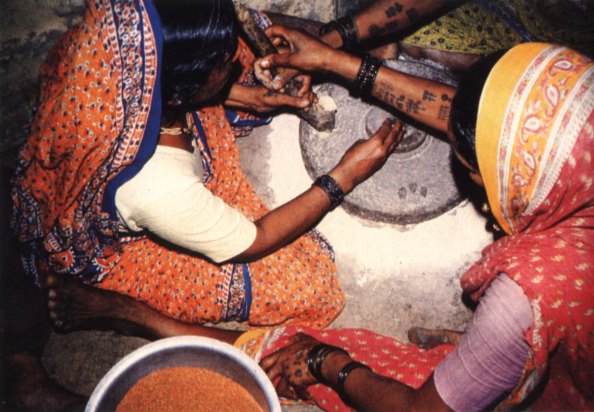Welcome on site: “I tell you woman!” (Sāṅgatē bāī tulā)
This site is dedicated to the documentation, translation and publication of a very large corpus of songs by Indian peasant women in Maharashtra, which they used to sing at dawn while working at the grindmill. The collection and analysis of this corpus started more than thirty years ago, initiated by the late Hema Rairkar and Guy Poitevin.
- Read the presentation of the project (in English) and biodata of its team members
- Read documents in English and in French
- Direct access to the corpus of songs and all related data
- Search the database for songs, people, places and themes
We migrated all data to the People’s Archive of Rural India (PARI) currently supporting translation/editorial work on this corpus. The project home page is here. Read Namita Waikar’s presentation of the new project: The grindmill songs: making music with stone and verse
Bienvenue sur le site « Je te dis, femme ! » (Sāṅgatē bāī tulā)
Ce site est consacré à la documentation, traduction et publication d’un très grand corpus de chants de femmes paysannes indiennes au Maharashtra, qu’elles interprétaient pendant leur travail matinal de la mouture du grain. La collecte et l’analyse de ce corpus ont débuté il y a plus de trente ans, à l’initiative des regrettés Hema Rairkar et Guy Poitevin.
- Lire la présentation du projet (en français) et celles des membres de l’équipe
- Lire les documents en français et en anglais
- Accès direct au corpus des chants et de toutes les données associées
- Consulter la base de données au sujet des chants, des personnes, des lieux et des thèmes
Nous avons transféré toutes les données vers le site People’s Archive of Rural India (PARI) qui soutient techniquement et financièrement le travail de traduction et d’édition de ce corpus. La page d’accueil du nouveau projet est ici. Lire la présentation par Namita Waikar de ce projet : The grindmill songs: making music with stone and verse
कावळ्यानी केल कोट बाभळीच्या खोडी
अस्तुरी येडी जात माया पुरुषाला थोडी
Kāvaḷyānī kēla kōṭa bābhaḷīcyā khōḍī
Asturī yēḍī jāta māyā puruṣālā thōḍī
The crow builds a nest in the trunk of an acacia
Womankind is naïve! Man has little affection
Le corbeau fait son nid dans le tronc d’un acacia
Sotte race de femme ! L’homme a peu de tendresse


How may I get these PDFs & audios?
LikeLike
Dear Balasaheb Dhumal,
On this site you have access to transcriptions, translations and metadata via the on-line database (https://grindmill.org/resources/database-en/). You can also listen to many recordings via the MP3 trimmer.
We are in the process of transfering all data and metadata from the SLDR archive (http://sldr.org) to People’s Archive of Rural India (PARI, https://ruralindiaonline.org/) handled by Ashoka University. We are also working on providing more English translations of song texts and complete the index of sound recordings so that all excerpts will be available in both MP3 and AIFF formats.
In the meantime you can download all data after signing up on the SLDR site. Once your account has been approved you will click the following link to fetch all sound recordings:
http://sldr.org/sldr000717/download/
The following item on SLDR contains annotations and metadata:
http://sldr.org/sldr000735
This will give you free access to exports of the database in several formats, conversion tools and various documents.
Access to data/metadata on SLDR is a bit messy because the archive site is also in the process of being migrated to another platform.
Please contact us if you need more details about the project and its data processing!
LikeLike
Bernard, you may also mention that they are at ARCE !
LikeLiked by 1 person
Dear Shubha,
You are right. I added a link on this page: https://grindmill.org/project/english/
I am keen to send you the set of recordings which are not yet stored at the ARCE if you can tell me the prefered format. We currently use OGG.
LikeLike
PARI site is not available on google. What can we do?
Chhaya Datar
LikeLike
If you search “PARI rural” on Google you will reach their home page: https://ruralindiaonline.org
From there you can get to the project presentation : https://ruralindiaonline.org/articles/the-grindmill-songs-recording-a-national-treasure/
LikeLike
I like very much that graindmill song project.thank you so much PARI….
LikeLike